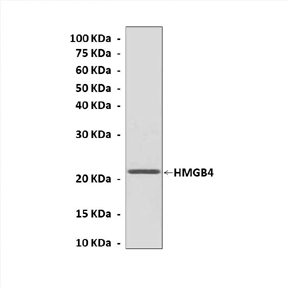Product Sheet CA1042
Description
BACKGROUND High-mobility-group-box (HMGB) protein family is a member of HMG super family proteins, the most abundant and ubiquitous non-histone chromatin binding proteins in eukaryotic cells. HMGB proteins bind to chromosomal DNA via their DNA binding motif, a HMG box, and induce structural changes of chromatin. They act as DNA chaperones influencing multiple processes in chromatin such as transcription, replication, recombination, DNA repair and genomic stability. Besides the chromatin binding property of HMGB proteins, HMGB proteins also interact with other proteins including transcription regulators and histones.1 In addition to those key transcriptional regulatory proteins, undoubtedly HMGB proteins bind dynamically to chromatin and interact with other proteins including transcription factors, thereby participating in transcription regulation in multiple processes. There are four HMGBs in mammals, HMGB1–4. Although HMGB1 is a nuclear protein, it can be secreted into the extracellular milieu as a signaling molecule when cells are under stress, in particular, when necrosis occurs. Mammalian HMGBs contain two HMG-boxes arranged in tandem, share more than 80% identity and differ in the length (HMGB1-3) or absence (HMGB4) of the acidic C-tails. The acidic tails consist of consecutive runs of only Glu/Asp residues of various length, and modulate the DNA-binding properties and functioning of HMGBs. HMGBs are subject to post-translational modifications which can fine-tune interactions of the proteins with DNA/chromatin and determine their relocation from the nucleus to the cytoplasm and secretion. Association of HMGBs with chromatin is highly dynamic, and the proteins affect the chromatin fiber as architectural factors by transient interactions with nucleosomes, displacement of histone H1, and facilitation of nucleosome remodeling and accessibility of the nucleosomal DNA to transcription factors or other sequence-specific proteins.2
HMGB4 is strongly and preferentially expressed in the adult mouse testis and weakly in the brain, but not in many other tissues. HMGB4 associates with chromatin, and in transfection assays, in contrast to HMGB1, it acts as a potent transcriptional repressor. During spermatogenesis, HMGB4 is present in the euchromatin of late pachytene spermatocytes and haploid round spermatids, whereas stronger expression is observed during the elongation phase, where it localizes to the basal pole of the nucleus in a manner mutually exclusive with H1FNT (H1T2) localized at the apical pole. HMGB4 basal localization is lost in H1FNT-mutant spermatids, showing that H1FNT provides a positional cue for organizing chromatin domains within the nucleus. These results show that HMGB4 and H1FNT specify distinct chromatin domains at the apical and basal poles of the elongating spermatid nucleus.3
HMGB4 is strongly and preferentially expressed in the adult mouse testis and weakly in the brain, but not in many other tissues. HMGB4 associates with chromatin, and in transfection assays, in contrast to HMGB1, it acts as a potent transcriptional repressor. During spermatogenesis, HMGB4 is present in the euchromatin of late pachytene spermatocytes and haploid round spermatids, whereas stronger expression is observed during the elongation phase, where it localizes to the basal pole of the nucleus in a manner mutually exclusive with H1FNT (H1T2) localized at the apical pole. HMGB4 basal localization is lost in H1FNT-mutant spermatids, showing that H1FNT provides a positional cue for organizing chromatin domains within the nucleus. These results show that HMGB4 and H1FNT specify distinct chromatin domains at the apical and basal poles of the elongating spermatid nucleus.3
REFERENCES
1. Ueda, T. & Yoshida, M.: Biochim. Biophy. Acta 1799:114-18, 2010
2. Stros, M.: Biochim. Biophy. Acta 1799:101-13, 2010
3. Catena, R. et al: Biol. Reproduct. 80:385-66, 2009
2. Stros, M.: Biochim. Biophy. Acta 1799:101-13, 2010
3. Catena, R. et al: Biol. Reproduct. 80:385-66, 2009
Products are for research use only. They are not intended for human, animal, or diagnostic applications.
Details
Cat.No.: | CA1042 |
Antigen: | Short peptide from human HMGB-4 sequence. |
Isotype: | Rabbit IgG |
Species & predicted species cross- reactivity ( ): | Human, Rat |
Applications & Suggested starting dilutions:* | WB 1:1000 IP n/d IHC n/d ICC n/d FACS n/d |
Predicted Molecular Weight of protein: | 22 kDa |
Specificity/Sensitivity: | Detects endogenous levels of HMGB-4 proteins without cross-reactivity with other related proteins. |
Storage: | Store at -20°C, 4°C for frequent use. Avoid repeated freeze-thaw cycles. |
*Optimal working dilutions must be determined by end user.
Products
| Product | Size | CAT.# | Price | Quantity |
|---|---|---|---|---|
| Rabbit High-Mobility-Group-Box 4 Antibody: Rabbit High-Mobility-Group-Box 4 Antibody | Size: 100 ul | CAT.#: CA1042 | Price: $375.00 |

